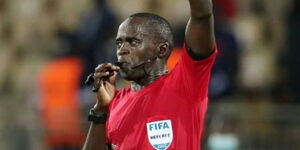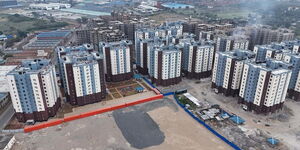A 13-year-old Class Eight pupil on Tuesday, January 7, slashed and killed his schoolmate after they reportedly differed while carrying out punishment that involved cutting grass at Randani Primary School in Kisii County.
The deceased's child, identified as Wesley Obare, 13, bled to death at the school playground, after his thigh was slashed by his machete-wielding comrade, while teachers were holed up in a staff meeting.
Witness reports alleged the teachers did not accord the necessary assistance in time and the boy was declared dead on arrival at Kenyenya Sub-county Hospital. The police have since taken over investigations on the matter as Obare's parents, Simon and Miriam, demand justice even as some media reports indicate the death was accidental.
Speaking to Kenyans.co.ke, Kisii Deputy County Police Commander, Wycliffe Wendo, informed that the first step in a murder investigation involving a suspect who is a minor is finding out the circumstances under which it happened.
Wendo explained that the circumstance would lead investigators into establishing a motive, that would then dictate whether a case proceeds to court.
''You cannot blame the teacher nor are you supposed to blame the student, but at the same time, the case must be thoroughly investigated. Usually, in child cases, the suspect may feel victimised and such cases can cause substantial psychological damage to children hence need to be handled with care," he remarked.
''They were just playing. Kids do play and anything can happen,'' Wendo noted.
''If it is determined that there was no malice or forethought, the case can even fail to go to court as the director of public prosecutions has the power to make that decision,'' he added.
According to a report published by CYC Online, an E-journal of the International Child and Youth Care Network on Juvenile Justice in Kenya, the country's correctional system does not give special treatment to child offenders.
The Kenyan criminal justice process for children lays more emphasis on rehabilitation and education rather than punishment. Terms such as conviction, sentence and imprisonment are reported to be rarely used, and children do not get criminal records.
''There is no special treatment within the police regarding arrested children. Commonly, the majority of children are held in police cells for the 48 hours between arrest and the first appearance in court. Once in court, children in need of care and protection and children accused of crimes are treated similarly,'' the report stated.
Child offenders are kept together in the same holding cells. Children from either group, guilty or innocent, may be remanded temporarily in police cells, or sent to juvenile remand homes.
The legal framework in Kenya currently supports very few juvenile courts. According to the Children Act 2012 Section 190 part (1-3), ''No child shall be ordered to imprisonment or be placed in a detention camp. No child shall be sentenced to death. No child under the age of ten years shall be ordered by a Children’s Court to be sent to a rehabilitation school.''
However, Section 191 does stipulate the measures in spite of the provisions of any other law and subject to Section 190, where if a child is tried for an offence, and the court is satisfied of his guilt, ''If the offender is above ten years and under fifteen years of age, by ordering him to be sent to a rehabilitation school suitable to his needs and attainment.''












